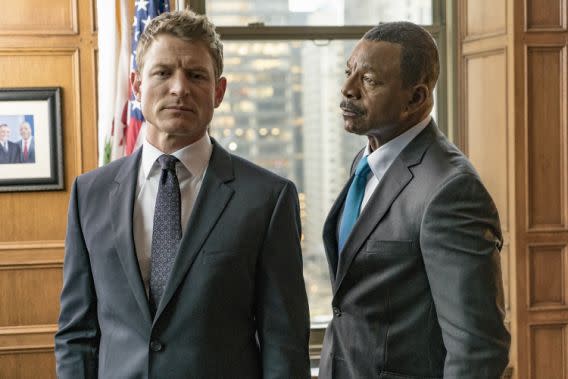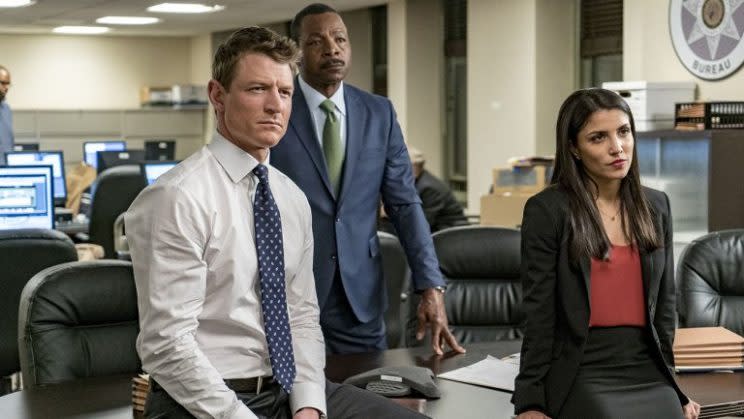‘Chicago Justice’ Preview: It’s ‘Law & Order For Millennials’

It’s not your father’s Law & Order, but it is kinda-sorta the Law & Order of Peter Stone’s father.
Peter, as portrayed by The Player star Philip Winchester, is the Assistant State’s Attorney and central character in Chicago Justice, the fourth entry in uber-producer Dick Wolf’s Chicago-set drama franchise. The Justice world was introduced last season in the Chicago P.D. episode titled “Justice,” and that connection continues with tonight’s “Fake,” a Justice episode that will wrap up a full night of crossover storylines that starts with Chicago Fire (8 p.m.) and Chicago P.D. (9 p.m.).
The bigger-picture link, though, is between Chicago Justice and Wolf’s iconic, signature series, Law & Order. Back to Peter Stone and his dad: papa Stone is Ben Stone, the New York DA played by Michael Moriarty for Law & Order’s first four seasons. Though Moriarty is not among the CJ cast — yet, anyway — the Ben Stone character, as well as several other legal types from L & O, is a presence in the new series, in philosophical influence on both his son and the spirit of the show.
Related: ‘Chicago Fire’ Crossover First Look: A Warehouse Goes Up in Flames
Chicago Justice showrunner Michael Chernuchin, an Emmy-nominated producer and writer on Law & Order, talked to Yahoo TV about Justice’s beginnings as an “updated Law & Order,” how the new series is different from L & O and the other Wolf-created Chicago dramas, and how deeply Justice will dive into the relationship between the Stone men.
Chernuchin also hints at some “ripped from today’s headlines”-type stories for Justice, and runs down the list of familiar L & O faces that will mix things up with Peter years after tangling in the legal arena with his dad.
It’s nice to be talking to you about this new show that, in a lot of ways, is a throwback to something that fans still love and miss and watch obsessively on several cable networks.
You know, I think [Law & Order] is playing someplace in the world every hour of every day.
You were one of the original writers, you were a showrunner, you are very connected to Law & Order. How strong do you feel the tie is between Law & Order and Chicago Justice?
Structurally, [Chicago Justice] is Law & Order: Not. What I tell people is that if you took a deck of cards, the Law & Order deck of cards, and you shuffled them, you’ve got Chicago Justice. There’s no strict paradigm to the show where we were strictly cops and then lawyers. [In] this, we approach every case from a different angle. Sometimes the lawyers come in early, sometimes they come in late, sometimes it’s all investigators. We change speed a lot. But there’s a big connection to Law & Order [with] our Assistant State’s Attorney, Peter Stone. If you remember the original Law & Order, Michael Moriarty was his dad, Ben Stone, the [Executive Assistant] DA.
Why did you choose Ben Stone to be the main L & O character to tie the series together?
Ben was our original guy. He was the moral center of the entire series, I think. He set the tone. We’re looking at this as Law & Order for a new century. We wanted that little connection. Most people won’t know, won’t realize the connection… the real Law & Order fans will pick up on it.
Related: #OneChicago Day: Stars From ‘Med,’ ‘P.D.’ and ‘Justice’ Share Their Pics
He’s not the only Law & Order connection. Lorraine Toussaint’s defense attorney, Shambala Green, was Peter’s opposing counsel in the Chicago P.D. episode that was the backdoor pilot for Chicago Justice. And we see Richard Brooks as Paul Robinette, Ben Stone’s former assistant, in the March 5 episode of Chicago Justice.
In that episode they’ll be talking about Ben Stone quite a bit… The way I looked at it, [Peter and Paul] were both Ben’s sons, in a way. They each have a different perspective on him. Both of them actually grew up in his shadow. It’s something they both, professionally, have to overcome.
Related: Our 25 Favorite ‘Law & Order’ Guest Stars
The involvement of the Ben Stone character in Chicago Justice begs the question: is there any chance that Michael Moriarty may pop up at some point?
You never know. I don’t know where he is now, but I mean, that would be interesting. We have other characters from Law & Order that show up, too. Tovah Feldshuh played an attorney, Danielle Melnick, in several episodes, and now she’s a judge in Chicago.
All of these Law & Order crossover characters you’ve mentioned so far are specifically characters who interacted with Ben Stone. Danielle is a tough defense attorney who went up against him in court.
Exactly. There’s a lot of nodding towards Law & Order, but it’s different. We want to attract Law & Order fans and [NBC’s Chicago franchise] fans. It’s a merging of the two franchises.
Was that the main idea that sparked Chicago Justice, that it would meld the two franchises?
We wanted to do Law & Order, the new Law & Order, updated. Law & Order for millennials.
When you were thinking about that, what did it look like? What was the flavor that would differentiate Chicago Justice from L & O?
Well, everybody’s younger. But the morality of Ben Stone hangs over the whole series. Peter is motivated by it. He doesn’t want to admit it, but he has the same morality as his father. He can’t escape it. Peter Stone had another career before he was a lawyer; he actually pitched for the Cubs. You’ll find that out in the crossover episode. In typical Law & Order fashion, you’ll learn about the characters with an eyedropper and not a ladle. Bit by bit you learn a little more, a little more, and by the end of the season, you know a lot about them, and you don’t even realize it.
That is such a trademark of Law & Order, and something a lot of fans really loved about the show.
Yeah, absolutely. I remember [Jerry] Orbach saying, “Can’t I just, can’t my partner die in my arms so I can emote?” “No Jerry, you can’t do that. We don’t do that.”

I don’t know if you’ve heard this, but Dick [Wolf] said, “The Chicago franchise is the human body, where Fire is the crotch, P.D. is the fists, Med is the heart, and Justice is the brain.” It really is one organism, and I hope, I think, that the crossover will show that, because all four shows [meet] in three hours, one night.
How tough was that to pull together?
It was tough. The story we chose to do naturally flows from one to the next to the next, but getting four shows coordinated was a hard thing. As the law side of it, I got kind of stuck with the facts that the other people gave me, you know what I mean? They found this piece of evidence … I’ve got to use that piece of evidence [in the legal part of the story]. It was fun, though, and when you see it all come together, it’s a beautiful thing.
Were you kind of painted into certain storyline corners that you had to write yourself out of then?
I’m a recovering lawyer. It’s like when you get a case, you’re given the facts, and you can’t do anything about the facts that you have. I felt like the lawyer prosecuting the guy who did this. “This is what the cops found, and I have to deal with it.” It worked out really well.
As a “recovering attorney,” are you a stickler for the little details that other people might not even notice if they weren’t right?
Absolutely. It’s not just the legal part of it, but I kind of know how lawyers think, and how lawyers approach a problem, and that’s what I want our characters to do, approach it the way real lawyers would.
When you were casting the role of Peter, was there anything in particular you were looking for in the actor who would portray him — perhaps a resemblance to Moriarty?
No, not really. What we did with Philip Winchester was say, “Watch the first two years of Law & Order,” and he’s picked up some of the mannerisms. He’s a little more macho than Ben was. Ben was very cerebral. Peter has that side of him, but he still is a physical guy. We told Philip that… you know, he’s used to playing action roles. We said, “Now you’re going to punch people with your words and with your eyes.”
Is there a chance for still more Law & Order characters to pop in on Chicago Justice?
Absolutely. That’s the beauty of this format. Every week there’ll be a defense attorney, and there are a bunch that we really liked [from L&O]. There’s absolutely no reason they can’t come back, except for the legal jurisdiction, which we can get around. I guess you can be admitted for a specific case. There are, in the 20 years of the show, a lot of attorneys that we loved. Shambala will come back again.
What kind of stories do you want to tackle with this series? Chicago is widely representative of pretty much everything that’s going on around the country.
We love to do issue-type shows, where they kind of sneak up on you, and the courtroom is less about law than about moral dilemmas. What we try to set up is that when you turn off the show, half the people want the guy convicted, half the people want him acquitted, based on the issue.
How did you begin choosing what things you would tackle in this first season?
You want a secret? Whatever happens to be pissing me off at the moment. I get to get on a soapbox, and I get to yell. Nobody will ever know what my politics are, because I yell on both sides. Those are the best episodes, the ones where everybody has a different opinion, and they’re all right. We do a gun episode, about gun control, and everybody has a different opinion. You’ll be surprised who comes out on which side.
New York was another character in Law & Order. Is that true of Chicago with Chicago Justice?
Yes, everything from eating Italian beef sandwiches to lots of steak, that kind of thing. We’re trying to live the city, and there are specific problems that city has, as everybody knows, and we deal with them head on. The rash of murders in Chicago… we deal with that. And we deal with it in a very interesting way that you’d never in a million years expect.
Chicago Justice premieres March 1 at 10 p.m. on NBC, followed by its timeslot premiere, Sundays at 9 p.m., on March 5.
Read More:
‘Once Upon a Time’: Ranking 16 of the Show’s Best Disney Characters
‘Arrow’: Juliana Harkavy on Black Canary’s ‘Desire for Justice’
Review: Hulu’s ‘National Treasure’ Explores the Sordid Downfall of a Beloved Comedian

